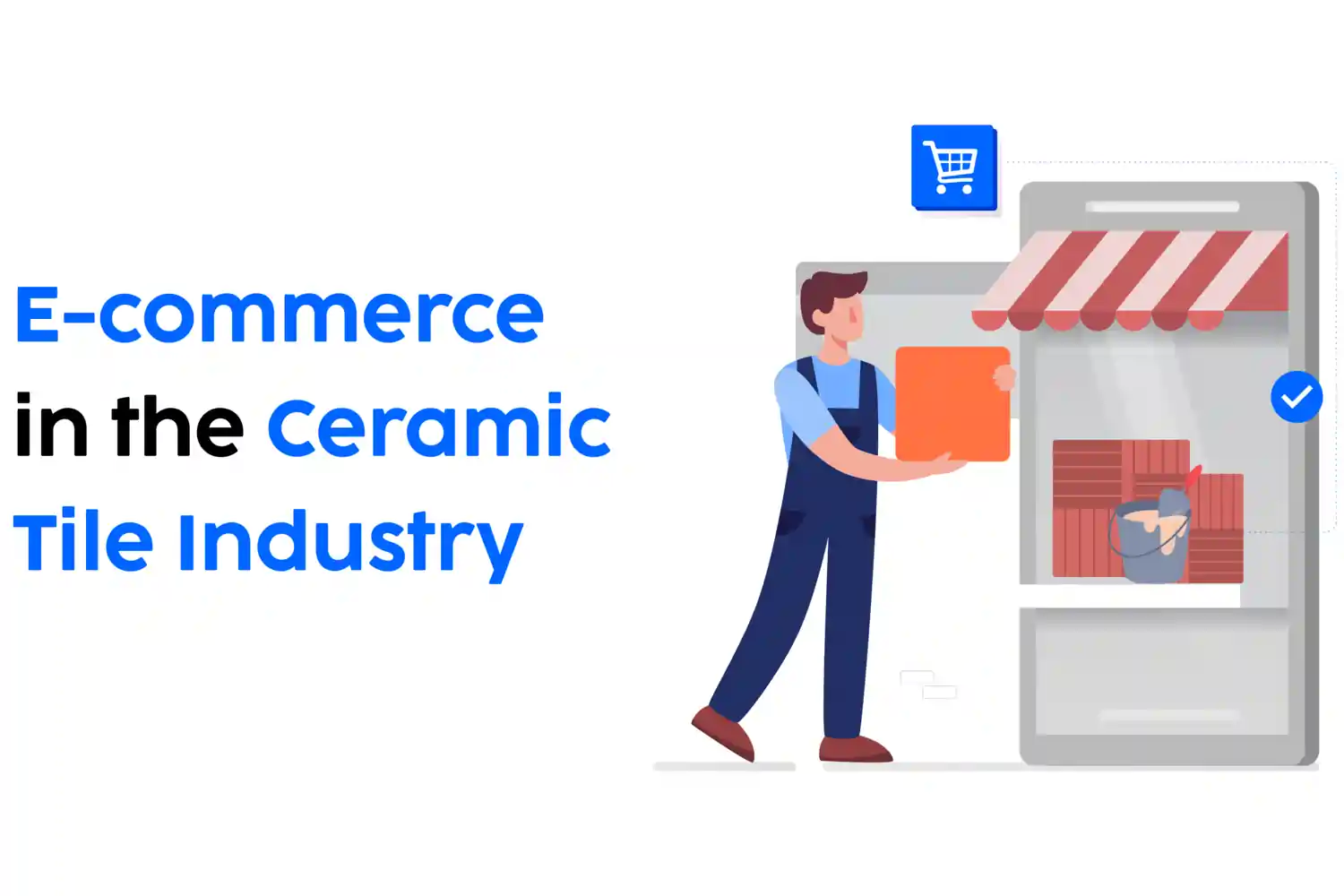
In recent years, the ceramic tile industry has been undergoing a profound change, and its primary driver has been the emergence of e-commerce. One of the industries which was mostly traditional and based on the numerous brick and mortar stores is gradually transitioning online, providing customers with optimal integrated experience. Technology has affected the tile manufacturing, marketing, and selling process so that consumers can purchase them online from the comfort of their homes. In this article, we will discuss how e-commerce evolved and affected the ceramic tile industry, which tools businesses use how the digital platform changes, and such niches as custom mobile app development and web development services.
First of all, the choice of the growth of e-commerce in the ceramic tile industry could be explained by changes in the customer’s demand. Customers are more knowledgeable and digitally induced, allowing them to research on the Internet before purchasing. Most of the consumers' purchase behavior has been influenced by the fact that they can move around and select from a large portfolio, do price comparisons, read about other customers’ experiences, and even get a feel of how the tiles would look in their houses.
The COVID-19 pandemic significantly enlarged this shift as consumers were confined to their homes while businesses needed to adapt and reach those consumers. Several tile retailers opened online stores during lockdowns or strengthened their online visibility to survive. This change has opened up new areas for expansion thus exerting pressure to adapt also to established store retailers.
Organizational buying behavior has described specifically how e-commerce platforms have helped to shape the development of online sales in the ceramic tile industry. The following are the main benefits of adopting the platforms; Companies have the opportunity to expand their markets and improve on stock control and customer relations. For instance, through digital catalogs, firms are able to display their products and even their attributes such as descriptions, images, and even videos all the customers need to do is browse through the different products without physically visiting the company’s store.
Also, through e-commerce platforms, firms are able to conduct customer analysis, sales analysis, and market analysis, and this helps to make better decisions. The introduction of technologies like artificial intelligence and machine learning helps to advance the shopping experience even more using customer behavior patterns for product recommendations.
The increasing degree of customization is another of the factors that have contributed to the development of e-commerce in the ceramic tile industry. Producers also noted that instead of having a generic look consumers are looking for tiles that are individual to them. This has created an increase in demand for varieties of tiles that customers can choose depending on the size, color, pattern, or even the finish.
Custom mobile application development and web application development services help deliver these offers hence the significance of the two services. Through these digital interfaces, businesses can provide their customers with design interfaces that enable them to customize designs on tiles. This level of customization not only increases the satisfaction level of consumers but also allows businesses to separate themselves from their competitors.
Augmented reality (AR) and virtual showrooms have snowballed into becoming the best practices in the ceramic tile industry. These technologies enable the clients to showcase how various tiles will appear in their houses, businesses, or any other premises before they buy the product. To this end, customers are able to use AR-enabled apps to take a picture of their space and see different tiling options.
This means that the uncertainty which is associated with purchasing tiles online such as not getting the exact color and design, is avoided. It empowers the customers to make better value-making decisions hence resulting in higher satisfaction with minimal returns. The implementation of Augmented Reality and virtual showrooms helps companies to interact with customers directly, helping them find products that they need while offering customers an excellent and unique shopping experience.
As a result, e-commerce, logistics, and supply chain management have also received a new and unique face in the ceramic tile industry. In the past, tile retailers used physical stores and depots to store and present their products to consumers. However, due to advanced sales organization through the Internet, new efficient and efficient supply chain logistics which incorporate just-in-time inventory management are being embraced.
This approach reduces the organizational space needed for storage of goods and to a great extent eliminates on the one hand the costs of warehousing, but on the other hand, it guarantees timely delivery of products to the customers. Most of them also include features such as order management and inventory updates in real-time, giving the customer full disclosure and comfort.
In addition, the application of digital technology in the supply chain contributes to proactively controlling business processes, decreasing lead time, and avoiding mistakes during supply chain processes. The use of data analytics can help the business be able to predict the demand for certain products to ensure they have stock in place should there be a demand.
This makes sustainability to be an important issue among consumers and also affects the ceramic tile industry. Most consumers are now focused on sustainable tiles that are harvested using green practices and created from recycled materials. E-commerce platforms are perfect for creating an image of a business and advocating for sustainable practices.
It is through online platforms that tile manufacturers can inform their audiences of the various green policies that they have put in place including the use of recycled material, energy conservation, and certified emissions among others. This not only appeals to the growing consumer advocacy for ecology but also plays a role in the separation of businesses in declaring their niche.
Further, businesses also provide extensive information about their tiles on the website, which when presented to the customers, can provide information about how these tiles can be eco-friendly. Another factor that makes e-commerce a viable option for businesses is that it helps to cut down the cost of operational expenses of stores and also, emissions from transportation.
The growth of e-commerce for the ceramic tile industry has prospects in the further years, which several trends will affect. The first trend of interest is the growing application of artificial intelligence and machine learning. Chatbots as a form of AI, for instance, can answer customers’ product-related questions, offer them relevant products, and guide them through the e-commerce site.
Moreover, by using the capability of AI, businesses can sort out customer behavior and interest in specific products, and therefore, attract their attention to promotions and discounts. Algorithms in machine learning are also used in the determination of business prices, with a view of making them more competitive in the market.
The second emerging area of consumer interest is mobile commerce, commonly referred to as m-commerce. More customers are now using Smartphones and Tabs to shop for tiles and hence the demand for this product increases. This has resulted in an increased emphasis on developing unique mobile applications for use in business, to attend to the needs of the mobile consumers.
There are many benefits of developing an app, such as better loading speed, push notifications, and offline availability, all of which lead to an improved shopping experience. Therefore, the development of customized in-house mobile applications will help business organizations maintain competitive advantages and guarantee the satisfaction of the target customers in the environment of the mobile world.
Despite the benefits of e-commerce in the promotion of ceramic tile products, the growth of this industry also has its downsides. However, there are some unique problems that you might find difficult to implement – for instance, transportation of goods. Tiles are heavy and slightly delicate: they are not easy and cheap to transport. Customers require strong packaging techniques and certified logistic companies to secure product shipments from different companies.
The last business challenge relates to the desire of organizations to meet the fast-growing need for digital literacy. Since the approaches are based on the idea that business and customer needs are constantly developing, businesses have to modify their e-commerce sites and online tools. This calls for reinvestment in the web development services and information technology systems.
These challenges are not devoid of opportunity for companies wishing to search for innovation and invest in technology. With sustained innovation, the enterprise can set itself apart from its competitors within the customer base, increase customer experience, and gain sustainable sales.
Boost your Search Engine Rankings with Digittrix's Proven SEO Techniques.
Let DIGITTRIX handle your SEO strategies while you focus on your business growth.
E-commerce has increasingly pushed its way into the ceramic tile industry and is radically transforming the ways companies within it do business and relate with their consumers. From virtual showrooms and augmented reality to artificial intelligence recommendation services and even the mobile app for individual customers, the digital platform is offering customers more custom solutions. Since companies remain committed to having better online visibility through web development services and other related products, the ceramic tile industry is expected to expand as well as increase its growth.
However, every coin has its other side; for companies that are willing to go for these changes, then the possibilities are endless. But in today’s ever-progressing terrain where consumer demands are continually unfolding, and more and more shares of the market are shifting online, the use of e-commerce as a tool for staying updated and profitable in the future is more than relevant.
E-commerce is transforming industries, and the ceramic tile market is moving swiftly into this digital shift. At Digittrix, we develop custom mobile apps that allow ceramic tile businesses to thrive online, integrating features like AI-powered customer support, white-label chat, and real-time order management for smooth online transactions.
With the growing trend of online shopping, your business can display products, manage customer interactions, and improve communication with suppliers—all in one app. Digittrix, backed by 14 years of expertise, creates website and mobile solutions to keep your business ahead in the e-commerce space.
Get started with your custom app! Call us at +91 8727000867 or email digittrix@gmail.com


Written by Harsh Abrol
With Over 14 years of Experience in the IT Field, Helping Companies Optimise there Products for more Conversions
Do you need help in Mobile App development ?




Join over 1500+ businesses we've already helped!
E-commerce has revolutionized the ceramic tile industry by providing consumers with a convenient way to browse tiles and purchase them online. through digital platforms Customers have access to a wide variety of tiles. Visualize their space using augmented reality. and even customize designs This change makes businesses Can reach a global audience and improve their operations.
Custom mobile app development and website development services play a key role in enhancing user experience in the ceramic tile industry. These services help businesses Able to create user-friendly applications and websites. Where customers can easily search product catalogs, purchase products, and even customize tile designs. It also helps integrate advanced features like virtual showrooms and augmented reality for better visualization.
Virtual and augmented reality (AR) showrooms help customers visualize how different tile designs will look in their space before purchasing. Using the AR-enabled app, customers can upload a photo of their room and see how different tiles look. What does it look like in real-time? Make the buying process more interactive and informative
The main challenges include transportation and logistics. This is because tiles are heavy and fragile. making it expensive to transport Businesses must also adapt to the constantly evolving digital landscape. and invest in website development services and IT infrastructure to remain competitive.

©2026Digittrix Infotech Private Limited , All rights reserved.